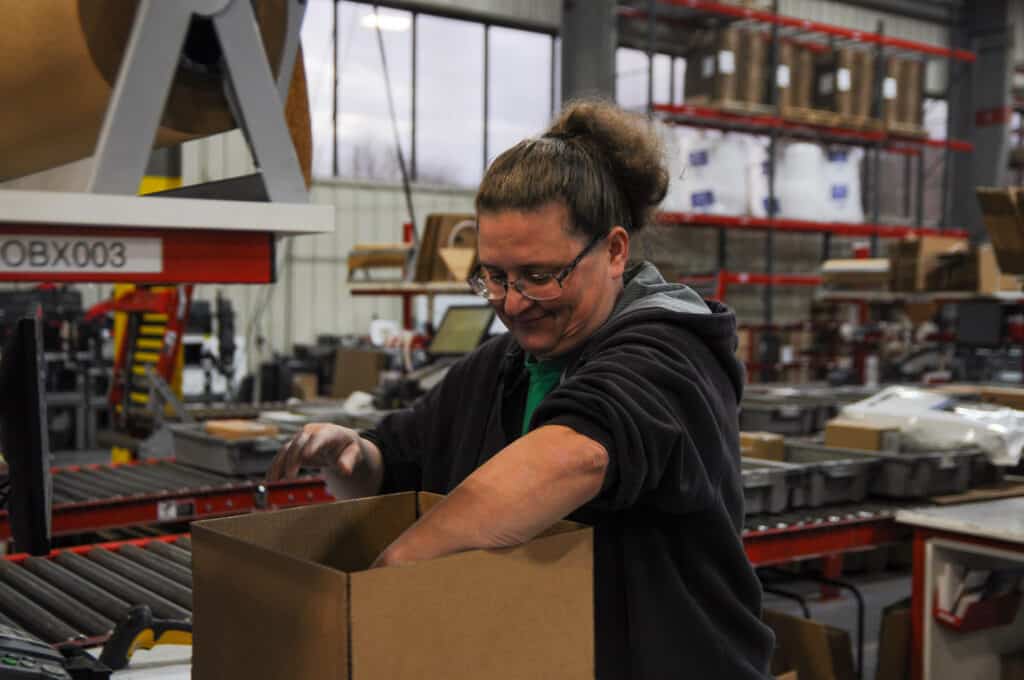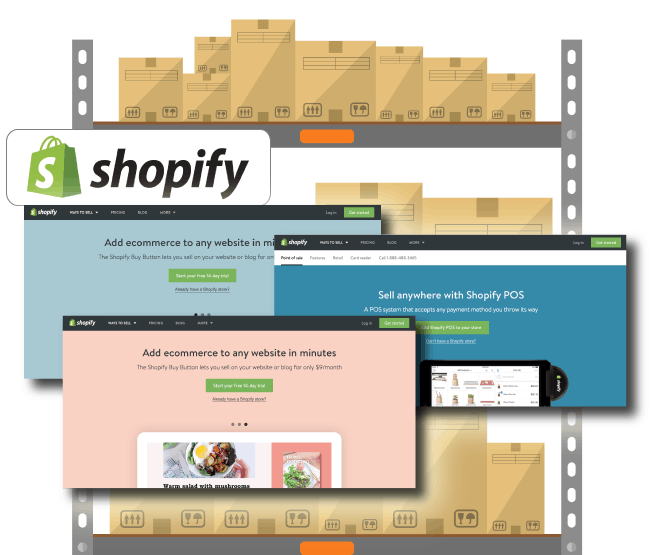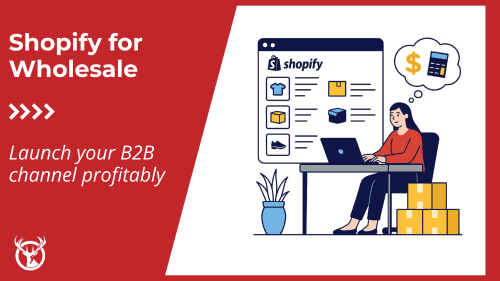When you’ve just made another sale on your webstore, you might see a Shopify “Request fulfillment” option pop up that just begs to be clicked. For new stores, that’s how you keep order management running smoothly. But this option doesn’t need a click when you’ve grown enough to automate. That’s true internally or when you outsource to a reliable partner like Red Stag Fulfillment.
This post will look at the Shopify request fulfillment and other settings that change as you transition and grow. Plus, we’ll highlight one Shopify area that trips up most business owners. That way, you can optimize your inventory and prioritize sales. We’ll keep your customers happy thanks to reliable, on-time, and accurate fulfillment.

TL;DR:
Key takeaways

Shopify’s “Request fulfillment” button sends notifications to your fulfillment team to process orders.

With Red Stag’s integration, you don’t need to manually click this button—everything is automated.

Red Stag’s plugin performs hourly syncs to ensure no orders are missed, providing a safety net for your business.

Watch out for Shopify’s inventory hold issue—uncanceled orders can prevent you from using available inventory.
What is the Shopify ‘Request fulfillment’ option?
01
Shopify has a “Request fulfillment” button that can be tempting to click when you’ve got an order. This option sends an email or system notice to your fulfillment team — whether in-house or third-party — to ask them to fill an order for you. The email contains all the relevant order information.
Typically, when you’re manually pressing this button, fulfillment happens manually too. That means you need to go back into your system and update it when fulfillment is complete.
This is an excellent tool for when just starting. It helps you move through the right eCommerce workflows and adds a check in place. That way, you know you’re appropriately managing orders. Shopify buttons and options like this become less critical as you grow, thanks to automation and partnerships.
Let’s look at how Red Stag Fulfillment addresses this specific Shopify request fulfillment option.

Automating your Shopify request fulfillment button
The best news about working with Red Stag Fulfillment is that you don’t need to worry about this setting or go into your dashboard to make changes or updates. Our integrations and automation support ensure that fulfillment requests always go through, and we take proactive steps to look for anything the platform may miss.

The Shopify ‘request fulfillment’ button doesn’t get used with our plugin because the settings used ‘automatically fulfill order line items,’ which will automatically submit the request to us.
If you don’t have that automatic setting enabled, every single order would have to use the request fulfillment button to have Shopify send that request. I can’t think of any partner who does this.

Patrick Molter
Red Stag Fulfillment’s Applications Management Specialist
If the setup enables the setting, you don’t need to take any action for order fulfillment to move forward. So, thankfully, it’s an option you won’t need to use or a button to go in and click. Automation with the Red Stag plugin or deeper integration ensures that nothing interrupts your Shopify fulfillment.
Backups to ensure fulfillment keeps moving
Not using that Shopify request fulfillment button can make some operators nervous. What happens if the automation doesn’t work or there’s some minor interruption to Shopify that causes an issue? Even if that occurs, Red Stag has you covered.

PRO TIP: Our plugin performs its own hourly sync outside the normal process to ensure we miss nothing. The normal process is that in Shopify, once an order is placed, Shopify requests fulfillment through the app and sends that information to us.
To protect our partners, our app calls back to Shopify every hour to look for orders that have a paid and unfulfilled status. It compares that against the orders we have in our system.
If it finds anything that we don’t have, the app automatically makes a request to Shopify to send those over to us.
02
A core focus of our Shopify fulfillment request work is to make orders flow seamlessly from your store to our fulfillment experts. There’s no reason to need manual processes or have you go in and make adjustments in most cases.
Automating those reduces your workload and lets you focus on sales and business development instead of order management. The most significant caveat comes with one way Shopify manages and may hold back your inventory, so we wanted to flag this for you and help.

ALERT: The biggest issue with Shopify is that it might be holding inventory. When orders are not closed out in Shopify, the platform holds that inventory.
So, if we have 100 units of an SKU available, but Shopify has 10 orders that are sitting in the order view and aren’t fulfilled, the system won’t let us, or you, use those 10 units — just the other 90.
Often, these are orders that have been abandoned or were supposed to be canceled — like if they were fraudulent. You’ve got to go in and actually cancel those orders in many cases.
This issue holds up your inventory and may make it look like our inventory management system has miscounted what’s available. It’s a common issue and we can walk you through the steps to filter, find, and address those orders.
The concern really is that many people don’t realize Shopify acts this way until there’s a concern. Our mission is to help you find and alleviate these concerns, so your business can grow smoothly and efficiently.
Advanced connections beyond just request fulfillment
03
Our native Shopify plugin is designed to work with a standard Shopify setup and a 1:1 relationship with us. That means you’re using us as your 3PL and we’re the only service fulfilling orders that come in via Shopify.
If you’re considering Red Stag as an alternative to in-house fulfillment or moving from another 3PL and want to split test fulfillment, a more direct integration may be required. However, we’ve got expertise to help your development team get there.
The same may be true for enterprise-grade software like ERPs. That’s because we want to help you get to a single version of truth within your system.
The native plugin is designed to control that truth, but a more advanced API connection can be used to support complex inventory and order management paradigms. “Whether you use the plugin or build a direct integration with the system or a middleware provider, we can facilitate as a partner,” says Molter.
A Red Stag sandbox is available
Red Stag Fulfillment offers our own internal testing sandbox environment to facilitate your plugin usage or API development. Here, we test and vet partner connections and scripts before moving into the production or live environment. “We offer this because it helps and lets our partners know we value the integrity of their data and systems,” says Molter.

Key Takeaway: Never underestimate the ability for testing to save operations and help leaders avoid pulling out their hair.
How can we help you master Shopify fulfillment requests?
04
The biggest thing we can recommend to master Shopify fulfillment requests is simple: let us or your partner know your plans.
Communication makes it easy to prepare and ensures your setup is safe and reliable. The goal is to make communications regular and consistent so you feel comfortable asking questions or verifying your store’s capabilities. Your 3PL should only improve and grow when your business does.


We ask that partners approach us when they’re thinking about using the plugin or integration. Between the onboarding team and I, we do a really good job of making sure you’ll understand the process. That covers what can and can’t happen and making sure all the boxes are checked so you have a successful launch and operations.
Working through technical issues and getting you onboarded and troubleshooting things that come up is more role. And solving problems to get your store up and running is what I enjoy doing. I want smooth sailing so that’s what I work toward.

Patrick Molter
Red Stag Fulfillment’s Applications Management Specialist
Red Stag Fulfillment experts like Patrick are ready to assist business owners in making their store a dream come true. They’ll help ensure your store is operating correctly and every Shopify fulfillment request comes through without issue. That way, you get back to the work you love and the sales where you’re a rockstar.
Ready to streamline your Shopify fulfillment?
To learn more about our process and ask questions about how our integrations make Shopify selling and fulfillment a breeze, click below to reach out. We can’t wait to learn more about your business and be a partner in your success.
















